In rural India, inadequate waste management is a pressing issue. The EcoGram initiative, a collaboration between Embassy Group and The Anonymous Indian Charitable Trust (TAICT), has emerged as a promising solution. EcoGram's journey in transforming waste management practices in Bettahalasuru Panchayat, North Bengaluru, offers valuable insights for creating replicable models for sustainable waste management in rural communities. Read on to explore this impactful initiative.
Overview:
Embassy Group is a leading real estate developer. The over 70 million square feet of commercial, residential, industrial and warehousing, hospitality, services, retail, and education spaces we have delivered emphasise high standards of quality, world-class services, environmental management, and safety. Founded in 1993, our operations now span the Indian and international markets of Bengaluru, Chennai, Hyderabad, Thiruvananthapuram, Mumbai, Pune, the NCR, Serbia, and Malaysia. Our 45 million sq. ft. of ready and ongoing residential developments encompass branded residences, uber-luxury villas, exclusive villaments, sky condominiums, integrated developments, senior living, and contemporary homes. Embassy was a sponsor of India’s first publicly listed and Asia Pacific’s largest Real Estate Investment Trust (REIT). We strive to build a resilient ecosystem and proactively foster the social, economic, and environmental developments of the communities we work in.
The Initiative:
The EcoGram Project was launched in 2016. EcoGram is a joint environmental initiative of Embassy and The Anonymous Indian Charitable Trust (TAICT). Today, the programme services over 4,000 households across 10 villages in the Bettahalasuru Grama Panchayat in North Bengaluru, collecting 3.5 metric tonnes daily, and fosters community development, women empowerment, environmental awareness, public health, economic growth, and environmental preservation. EcoGram also provides an opportunity for corporate employees to engage in various volunteering activities. The project's success relies on effective collaboration between local governance, corporates, and NGOs and on the strategic policies that make it a sustainable, replicable model.
Problem Statement:
The Bettahalasuru Panchayat suffered from air, water, and soil pollution, with garbage from approximately 2,500 households (around 53 metric tons per month) being dumped and burned. There was a low level of involvement and understanding of sustainable living methods from the communities, an increasing loss of biodiversity, and overuse of natural resources. Due to the rapid expansion of the Bengaluru metropolitan area, Bettahalsuru Panchayat ran the risk of becoming an urban dumping ground like many other areas in the city.
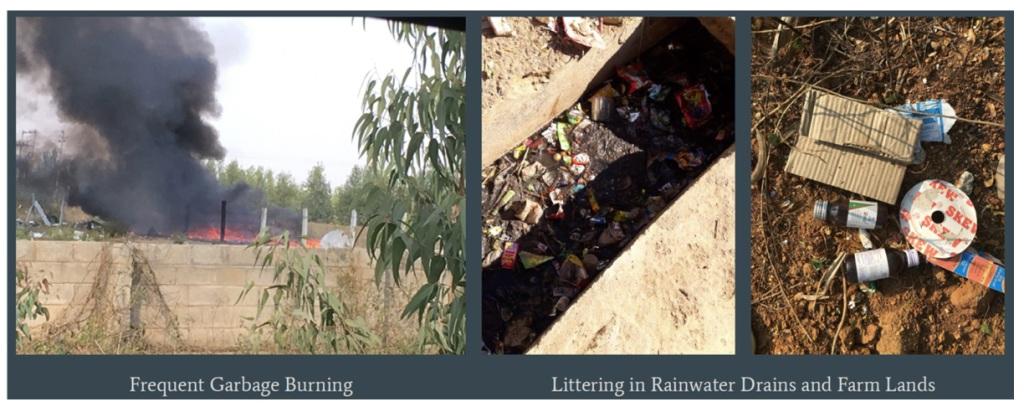
Myriam Shankar, Managing Trustee of The Anonymous Indian Charitable Trust (TAICT), approached Embassy with a solution—addressing the lack of accountability and ownership over our diminishing natural resources and distressingly high rates of pollution. Together, the partners jointly aim to create an ecologically sound replicable model Gram Panchayat to propagate sustainable waste, water, and soil management.
What began as a pilot project in Tarahunise village now encompasses ten villages in the Bettahalasuru Panchayat. Implementing waste management in a locality that never saw a dustbin, let alone 3-way segregation at source, is an incredible uphill task. It entails creating intensive awareness amongst all stakeholders, be they local government representatives, village residents, or commercial establishments. It requires setting up solid operations of men, machinery, and infrastructure. The programme had to encompass end-to-end waste, including collection, transportation, secondary segregation, and further processing. In addition to creating a positive environmental impact, the project also provided employment for marginalised communities.
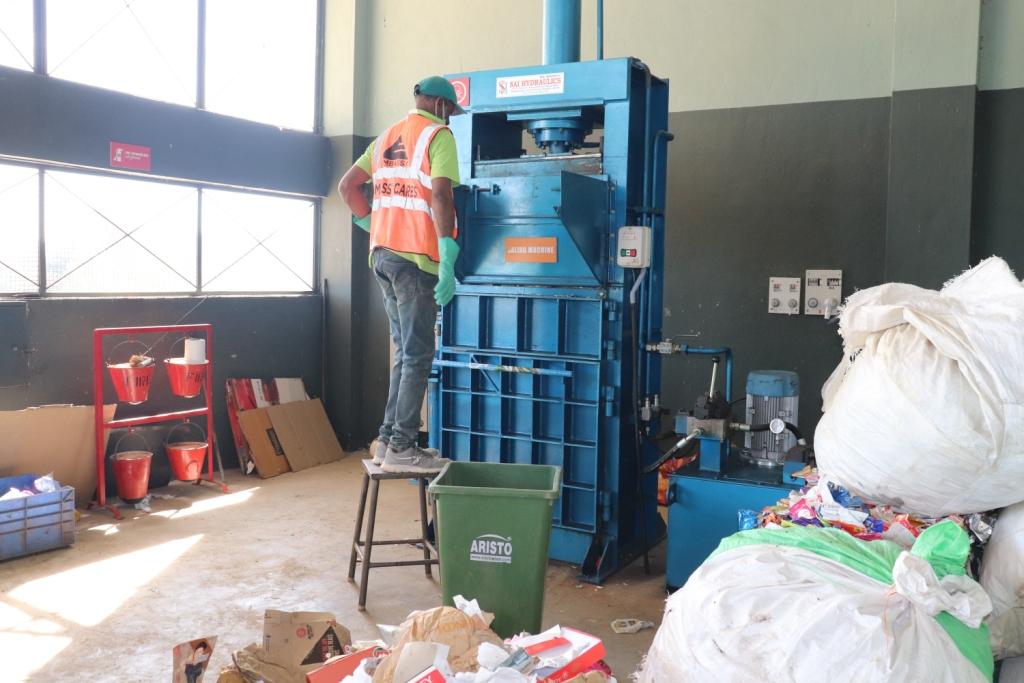 Implementation Strategy:
Implementation Strategy:
The project focused on bringing together members of the community, the local government, administrative bodies, and investors to address the issues of irresponsible disposal of garbage and depletion of soil and water. TAICT had to first get buy-in from the panchayat leaders in a series of meetings held in 2016. As a part of their first phase, they brought in multiple partners to set up a solid waste management system in the Tarahunise village. They then conducted a baseline survey to understand the demographic make-up and land-use patterns of the village.
Embassy and TAICT’s decentralised solid waste management allowed waste generators to sort waste into 3 categories at source using the 2bin1bag methodology. The collected organic waste is then converted into compost, and the recyclable waste is sorted at a dry waste collection centre, all within the Gram Panchayat. Segregation at source is currently at 92% for the villages and 90% for bulk generators in FY24.
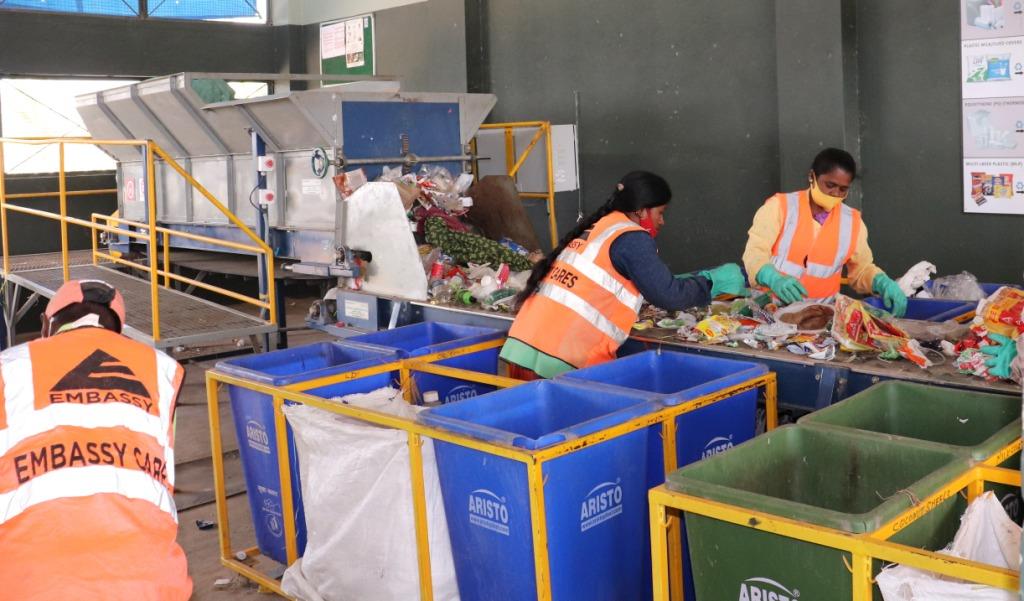 To complement the solid waste management infrastructural solutions provided in the Panchayat, a strong emphasis is also placed on community engagement and awareness initiatives curated by women and children in the communities. Under the EcoGram Shakthi Programme, women of the Gram Panchayat are empowered to take ownership of their villages in terms of environmental sustainability. The initiative serves as a livelihood programme through the sale of local food and craft products as well. Increasing engagement and civic awareness, TAICT developed a set of educational materials called ‘Trashonomics’ targeted at educating children on solid waste, its environmental, health, and financial impacts, and liquid waste management, which concerns water consumption and management. Children also participate in EcoGames, an annual summer camp that encourages them to find creative ways to raise awareness amongst their communities.
To complement the solid waste management infrastructural solutions provided in the Panchayat, a strong emphasis is also placed on community engagement and awareness initiatives curated by women and children in the communities. Under the EcoGram Shakthi Programme, women of the Gram Panchayat are empowered to take ownership of their villages in terms of environmental sustainability. The initiative serves as a livelihood programme through the sale of local food and craft products as well. Increasing engagement and civic awareness, TAICT developed a set of educational materials called ‘Trashonomics’ targeted at educating children on solid waste, its environmental, health, and financial impacts, and liquid waste management, which concerns water consumption and management. Children also participate in EcoGames, an annual summer camp that encourages them to find creative ways to raise awareness amongst their communities.
In 2020, recognising the in-depth work carried out by Embassy and TAICT over the years, the Panchayat signed a Memorandum of Understanding (MoU) with Embassy, allocating 2 acres of land dedicated to the collection and segregation of dry and wet waste. Further, the Panchayat requested Embassy Office Parks REIT to build a solid waste management centre with a greater capacity for gathering and sorting waste. In 2022, Ecohub was inaugurated. This enabled the extension of waste collection to all ten villages within the Bettahalasuru Panchayat.
Measuring Success:
Weekly meetings are undertaken to assess the 13 key performance Indicators.
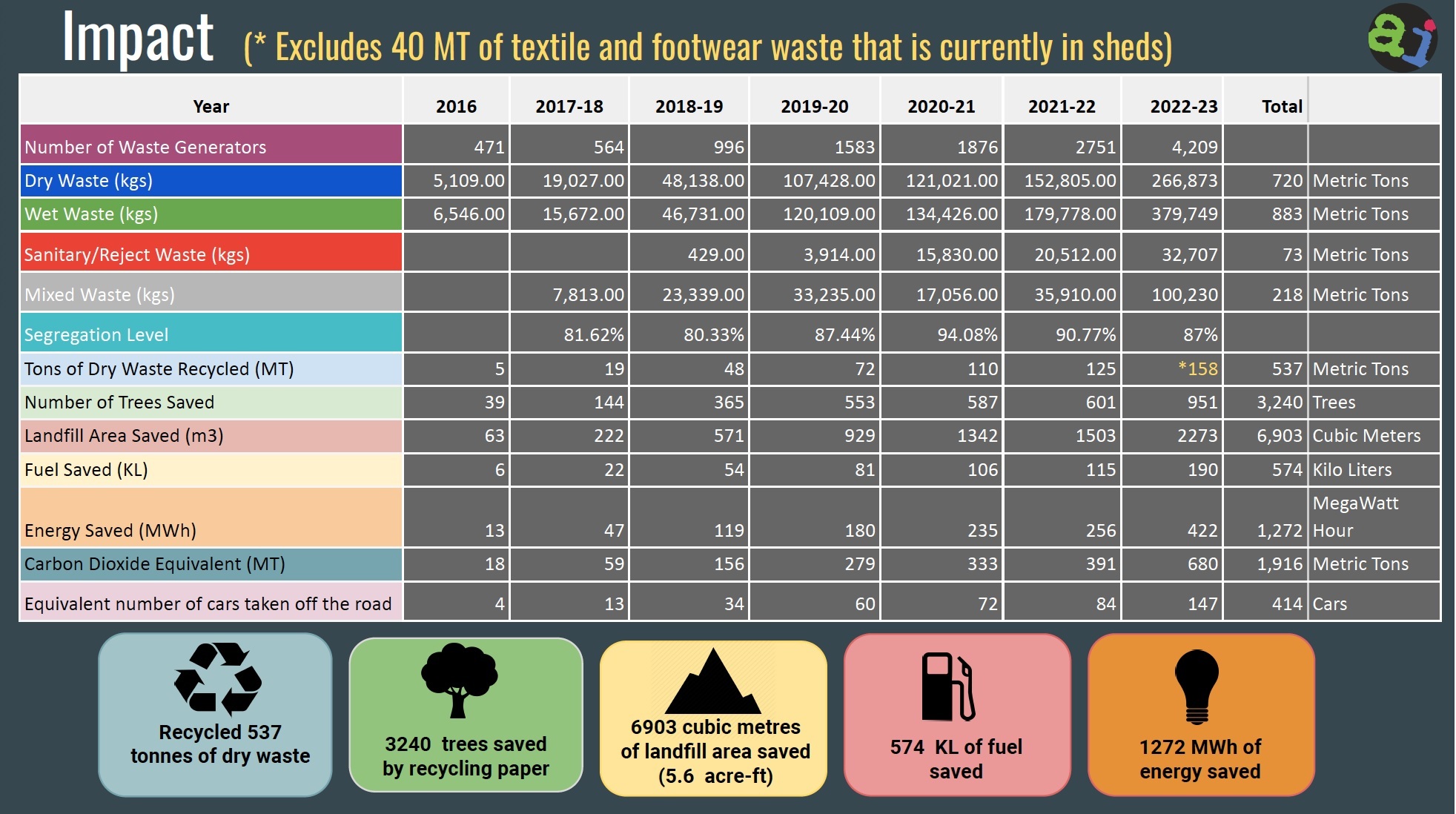
Challenges and Overcoming Them:
- Inadequate Institutional Capacity: Village administrations lack the institutional capacity and expertise to monitor and enforce SWM policies. TAICT is in the process of setting up a steering committee to overcome this challenge.
- Currently, sanitary waste is a challenge; however, TAICT is undertaking research into biomedical waste vendors and incinerators, as well as increasing awareness around more sustainable sanitary waste methods.
- When the programme reaches a new village, it is a challenge at the beginning to get buy-in from residents to segregate and participate in waste collection. Intensive awareness and meetings with village leaders have enabled the project to overcome this.
Scalability and Replication:
These projects work towards producing a self-sufficient panchayat, with residents of all ages regularly participating in clean-up drives and awareness marches. Embassy and TAICT’s partnership with the Panchayat demonstrates the importance of engaging local residents as well as mid- and high-level decision-makers in bringing about the desired behavioural change to improve the environment. The success of the pilot project encouraged participation from the communities in defining the issues, contributing to data collection, and providing their time and resources towards EcoGram’s activities.
This is a programme that can be replicated across India in partnership with various panchayats and driven by the local residents. The partnership between TAICT and Embassy is a collaborative effort, pooling resources, expertise, and networks. This collaborative approach fosters shared responsibility, knowledge exchange, and a broader reach, which can be replicated with other organizations or stakeholders interested in similar initiatives.
Recognition and Awards:
- TAICT and Ecogram have received multiple awards and recognitions; some of the more recent ones include:
- EcoGram won the 9th National CSR Times Award in 2023.
- The Ministry of Rural Development and Panchayat Raj awarded Bettahalasuru Grama Panchayat the Gandhi Grama Puraskar on October 2nd in recognition of the Grama Panchayat's successful implementation of state and federally sponsored programmes pertaining to solid waste management, drinking water, women's empowerment, health, and hygiene in the years 2022–2023.
- TAICT participated in Brand Bengaluru in 2023, which is an initiative of the Hon' DCM DK Shivakumar. TAICT was invited on the day of the inauguration to submit suggestions on how to improve solid waste management in Bengaluru.
Key Learnings: The Way Forward
It is important to recognise the role that citizen and local-led environmental movements can play. Involving local and key stakeholders greatly increases the effectiveness of engendering systemic change and increasing accountability. The recipe for effective change is understanding that environmental issues are best handled when all concerned citizens at every level participate. Harnessing the strength of our communities and partnerships towards change ensures that we are laying firm groundwork for continued and future change.




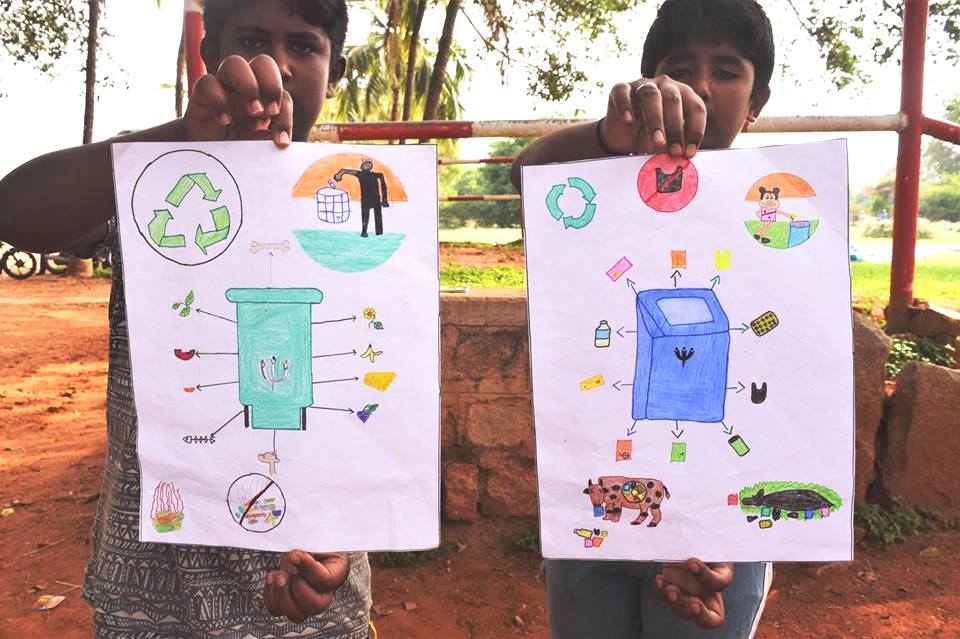

 Implementation Strategy:
Implementation Strategy: To complement the solid waste management infrastructural solutions provided in the Panchayat, a strong emphasis is also placed on community engagement and awareness initiatives curated by women and children in the communities. Under the EcoGram Shakthi Programme, women of the Gram Panchayat are empowered to take ownership of their villages in terms of environmental sustainability. The initiative serves as a livelihood programme through the sale of local food and craft products as well. Increasing engagement and civic awareness, TAICT developed a set of educational materials called ‘Trashonomics’ targeted at educating children on solid waste, its environmental, health, and financial impacts, and liquid waste management, which concerns water consumption and management. Children also participate in EcoGames, an annual summer camp that encourages them to find creative ways to raise awareness amongst their communities.
To complement the solid waste management infrastructural solutions provided in the Panchayat, a strong emphasis is also placed on community engagement and awareness initiatives curated by women and children in the communities. Under the EcoGram Shakthi Programme, women of the Gram Panchayat are empowered to take ownership of their villages in terms of environmental sustainability. The initiative serves as a livelihood programme through the sale of local food and craft products as well. Increasing engagement and civic awareness, TAICT developed a set of educational materials called ‘Trashonomics’ targeted at educating children on solid waste, its environmental, health, and financial impacts, and liquid waste management, which concerns water consumption and management. Children also participate in EcoGames, an annual summer camp that encourages them to find creative ways to raise awareness amongst their communities.
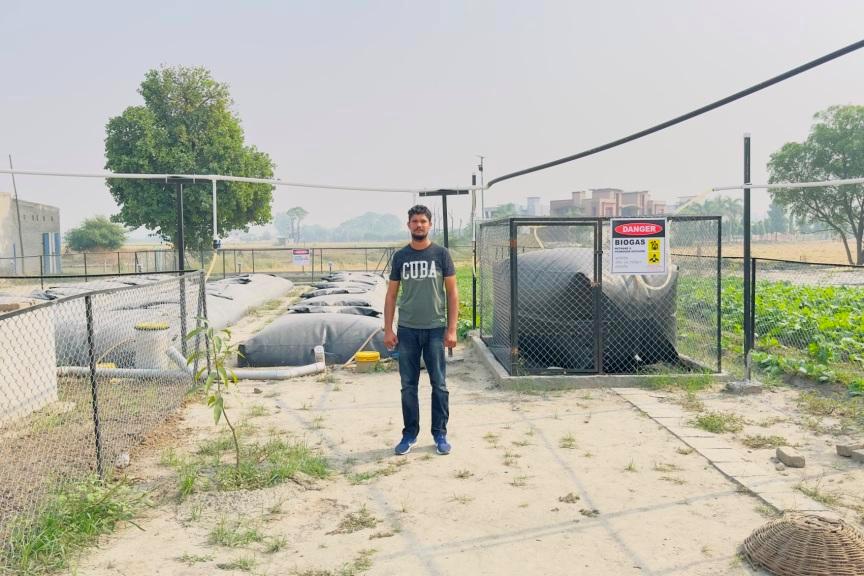







.jpg)



